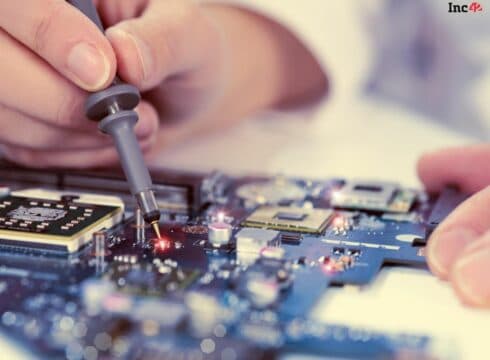Hong Kong-based hardware accelerator, Brinc has hosted two cohorts of its Hardware & IoT programme to boost hardware and product-based startups
The programme provides each startup with an investment of up to $250K in exchange for 12.25% to 22.42% equity
The last date for submitting the application of the programme is August 15
Inc42 Daily Brief
Stay Ahead With Daily News & Analysis on India’s Tech & Startup Economy
The Hong Kong-based accelerator, which is also the first international accelerator for hardware startups in India — Brinc —, is inviting applications for the third cohort of its Hardware & IoT Programme in the country. Launched in the country in 2019, Brinc accelerator has already hosted two cohorts in an attempt to boost hardware and product-based startups in the country.
The hardware accelerator that also acts as an education platform, product development studio and distribution platform for the startups. Brinc launched the programme to support startups from across sectors such as IoT, robotics and more, in association with the Kerala Startup Mission (KSUM).
The programme provides comprehensive support to mid-stage startups, with working prototypes and ready to move to their design for manufacturing (DFM) phase.
The selected startups, who progress through the programme levels can receive up to $250K in investment and additional support services to develop their DFM (Design for manufacturing) products and bring their businesses to the market.
“We are announcing the third cohort of our Hardware & IoT programme to help the startups in India. The selected startups will get mentorship from the international team of Brinc. These experts will guide and mentor startups on a case to case basis via custom-designed business and technical training sessions,” head of the programme, Dr Mikhail Zenchenkov, told Inc42.
Kerala’s bullish and proactive approach for its startup ecosystem has yielded results that are acknowledged and visible to the entire country. The startups from the state have helped it counter various challenges including the current pandemic.
According to the KSUM CEO Dr Saji Gopinath, the state has added over 300 startups in the last four months alone. And out of the total over 50% are hardware startups who have pivoted their products to fight and help the state regain normalcy amidst Covid-19.
KSUM efforts towards the startups have been right from the grassroots level to helping them reach the global markets. And aiding that journey is collaborating with Maker Village and Brinc, both of which have a laser focus on hardware startups.
Apply NowMentors In The Programme Include:
- Bashar Aboudaoud, cofounder and CSO, Brinc
- Heriberto Saldivar, Managing Director, Brinc Accelerator
- Estefania Almeida, portfolio manager, Brinc
- Bay McLaughlin, cofounder and COO, Brinc
- Mikhail Zenchenkov, head of the programme, Brinc
- VIncent Gu, technical head of programme, Brinc
The Previous Cohorts Of the Programme
Having hosted two cohorts of the programme, the accelerator has helped startups from across sectors such as hardware, IoT, foodtech, manufacturing, big data and analytics, agritech, healthtech, deeptech and more.
Startups From Cohort 1
In its first cohort, the programme hosted startups such as:
- Nava: NAVA has developed a robotics solution for tapping sap from coconut trees. Not only is it solving the scarcity of manual tappers but also increasing the farmer’s income by 200% when compared to the manual tapping methods, claims the startup.
- Vacus: Vacus has developed indoor positioning technology with 30 cm accuracy to track people and assets inside premises. The product focusses on use cases of accurate accountability of assets and people thereby ensuring improvised productivity and safety/security. With paying customers in India and Singapore, Vacus has a focus on data centres, enterprises, warehousing/logistics.
Startups From Cohort 2
In its second cohort, the programme hosted startups such as:
- Muse: Muse Diagnostics is a medical device company and has a product Taal, a digital stethoscope with an app and platform that helps health professionals screen their patients more effectively. It enables this through capturing a patient’s body sounds in high definition and then filtering, storing, sharing and analysing it at a comparable price to traditional non-digital devices.
- Peer Robotics: Peer Robotics is a collaborative mobile robotics company, bridging the gap between how humans and robots work together. The robots are capable of learning from humans in real-time, providing flexible and adaptable solutions for manufacturing, warehousing, and healthcare sectors.
- Probus: Probus has developed and implemented an integrated platform that reduces outage duration, saves transformers from getting destroyed in fires, and identifies critical assets to prevent energy losses. It helps save the utility about $70 per asset per month.
Who Can Apply?
Focussing on startups from India, Brinc has laid down the following criteria for the startups to apply to the programme:kerala
- The startup should have a product that fits within one of the Brinc’s Hardware & IoT investment categories and addresses the clearly defined market needs
- The startup must have a working prototype or show the technical capabilities of being able to produce the product
- The startup should have a minimum market traction
- The startup should have at least two cofounders with relevant industry experience
- The startup should have a scalable, innovative business model with high growth potential
- The startups entering the accelerator programme will need to have at least one member of the team in Kochi for the entire duration
The last date to apply to the programme is August 15 and only five startups are selected for it. Apply Now before all the slots are full.
Apply Now{{#name}}{{name}}{{/name}}{{^name}}-{{/name}}
{{#description}}{{description}}...{{/description}}{{^description}}-{{/description}}
Note: We at Inc42 take our ethics very seriously. More information about it can be found here.


